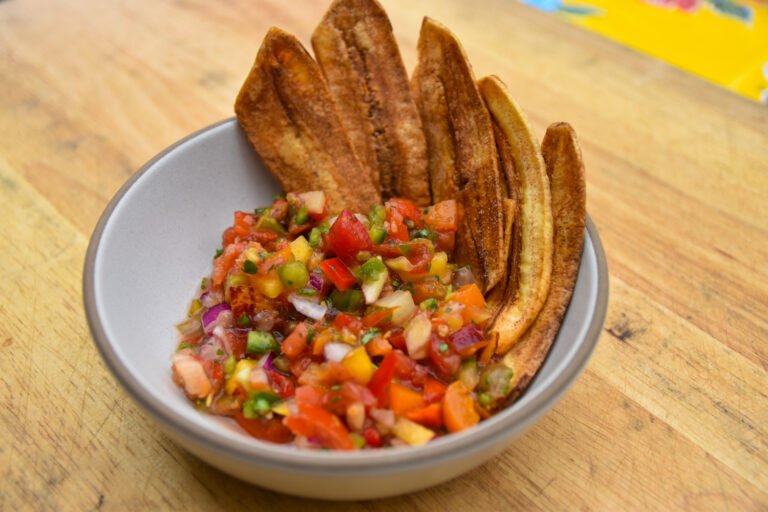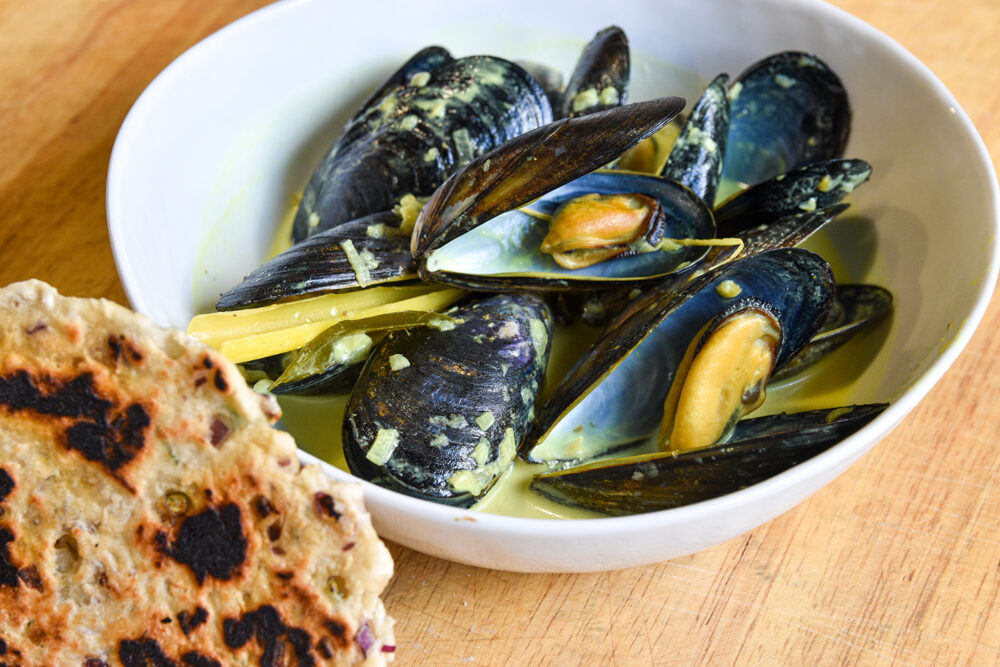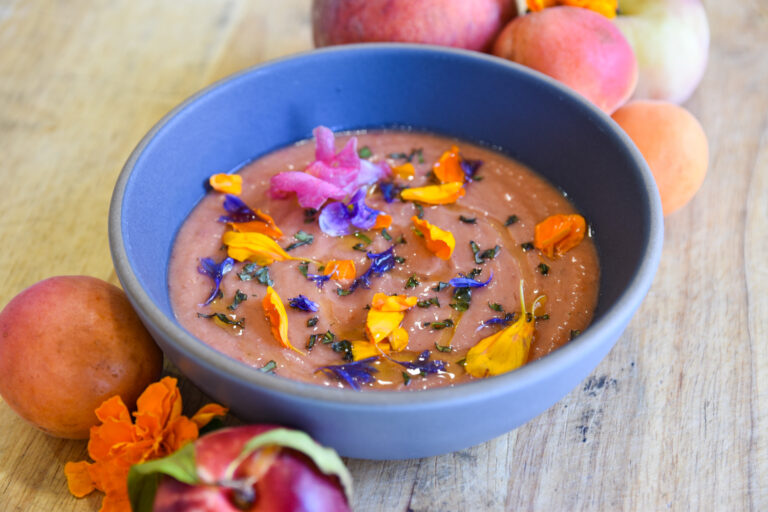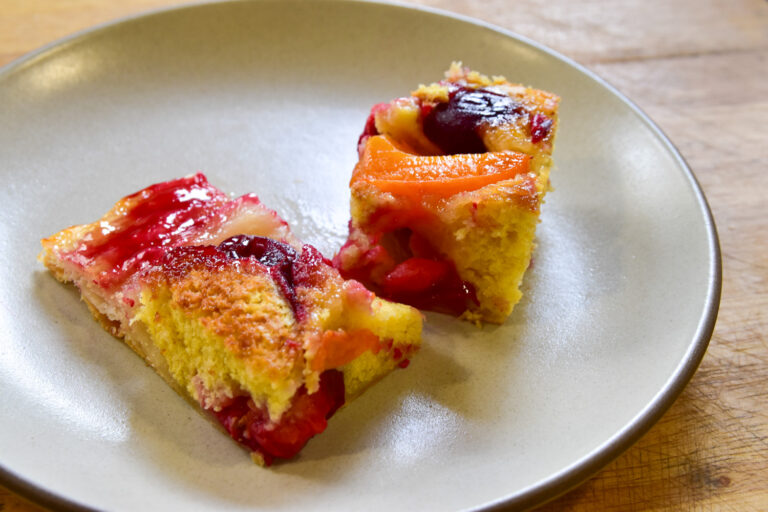
Mussel Hodi and Pol Roti
Source: Karan Gokani, Hoppers: The Cookbook from the Cult London Restaurant

Recipe Type: Appetizers and Sides, Entrees | Seasons: Spring, Winter
This recipe appears in Hoppers: The Cookbook from the Cult London Restaurant by Karan Gokani (Hardie Grant, 2022) and was demonstrated at the Foodwise Classroom on February 25, 2023.
Mussels are one of those underrated, great value, sustainable products that ought to be used a lot more. Clams and cockles are popular in stir-fries and curries back home, but I prefer the sweeter, plumper mussels and find any opportunity I can to cook with them. They are dead easy to prepare and cook and cost a fraction of what you’d pay for a lot of other shellfish. I first cooked this dish at an event held at a friend’s pub; it was meant to be a Sri Lankan take on the classic Moules Frites. The dish was so popular that we ended up introducing it on our menu at our Kings Cross restaurant. We serve it with string hoppers, great for soaking up the gorgeous curry, and a samphire sambol (Hoppers, page 169).
Pol roti is one of my favourite flatbreads from Sri Lanka. I love how unassuming this rustic roti is and often include it in my cooking classes and demos because students are blown away at just how delicious something so simple can be. What’s more, these rotis are dead simple to make and very forgiving. The addition of fresh coconut keeps them juicy, while the onions add a beautiful sweetness when charred. All this is lifted by a punch from the chillies and curry leaves. We use plain (all-purpose) flour as opposed to bread flour in this recipe, which gives a softer, tender crumb. When freshly made, all these rotis need is a slathering of good salted butter and a generous serving of pol sambol. That said, they are dangerously addictive as dipping agents for a curry too.
Mussels Hodi
Serves 4 as a starter
INGREDIENTS
3 tablespoons coconut oil
1/3 teaspoons fenugreek seeds
1 9 centimeters (3½ inches) cinnamon stick
165 grams (5¾ ounces) red onion (approx. 1 medium onion), finely sliced
2 teaspoons minced garlic
2 lemongrass sticks, cut into 5 centimeter (2 inch) pieces
12–15 curry leaves
¾ teaspoons ground turmeric
400 milliliters (14 fluid ounces) coconut milk
2 green chilies, halved lengthways
½ teaspoon salt
600 grams (1 pound 5 ounces) live mussels, washed, and beards removed (see note)
juice of ½ lime
PREPARATION
Heat the oil in a large, lidded saucepan over a medium heat. Add the fenugreek and cinnamon and fry for 30 seconds, then add the onion, garlic, lemongrass and curry leaves and continue to cook for 2 minutes, stirring regularly until soft but not coloured.
Add the turmeric and cook for a further 15 seconds, stirring to ensure it doesn’t catch and burn.
Stir in the coconut milk and green chillies, bring to a simmer and leave to cook gently for 4 minutes, being careful not to let it boil.
Taste the sauce and season to taste, leaving it underseasoned to allow for the salty mussels.
With the sauce on a high simmer, add the mussels to the pan, cover with a lid and leave to cook for 2–3 minutes. Shake the pan every 30 seconds or so; this will help the mussels to cook and open evenly.
After 3 minutes, discard any remaining mussels that have not opened and stir through the lime juice.
Garnish with chilli oil and samphire sambol, before serving immediately with String Hoppers (Hoppers, page 107), rice or by itself.
NOTE: Prepare the mussels before cooking by rinsing well in clean water and scrubbing away any grit from the surface, then pulling away the beards. Check for any mussels that are open and discard any that won’t close when given a sharp tap on the worktop. If you want to get ahead, you can prepare this recipe up to the end of step 1 and keep the sauce chilled in the fridge. Heat it up when you’re ready to cook the mussels.
Pol Roti
Makes 8-9
INGREDIENTS
250 grams (9 ounces) plain (all-purpose) flour
1 teaspoon sea salt
½ medium red onion, finely chopped
1 green chilli, finely chopped, (seeds removed if you prefer it less spicy)
8–10 curry leaves, finely chopped
1 tablespoon coconut oil
100 grams (31⁄2 ounces) fresh or frozen grated coconut
warm water, as required
PREPARATION
Mix all the ingredients together in a large mixing bowl and add a little water at a time as required to bring together into a cohesive dough that is soft but does not stick to your hands. The dough should have the consistency of Play-Doh and be fairly firm but shouldn’t feel dry or have any pockets of dry flour in it.
Knead for about 5 minutes by hand; there’s no need to use a stand mixer for this. Leave to rest at room temperature, covered with cling film (plastic wrap), for about 30 minutes.
Divide the dough into 8–9 balls and roll out into 15cm (6in) discs the thickness of two stacked one pound coins. I prefer a slightly rough, natural look rather than perfect circles.
Heat a dry non-stick pan or well-seasoned cast-iron pan over a high heat and then reduce the heat to medium and cook the rotis for 3–4 minutes, flipping halfway through. The key is not to use oil or fat when cooking the rotis and to cook them on a hot dry pan, so they roast as opposed to fry.
Top with a drizzle of coconut oil or dollop of butter and a spoonful of freshly grated coconut before serving. If making these ahead, store them in a box wrapped in a clean paper towel. If you need to reheat them, flip them in a hot pan for 30 seconds to 1 minute.
NOTE: I often cook these on a barbecue in the summer – start them off on a griddle set over medium fire, then finish on the grill directly over fire to char slightly.
Excerpted from Hoppers: The Cookbook from the Cult London Restaurant. Copyright © 2022 by Karan Gokani. Used with permission from Quadrille, an imprint of Hardie Grant Publishing. Melbourne, Australia. All rights reserved.


